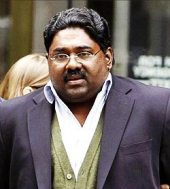 | « Back to article | Print this article |
Galleon unwinding India investments
 Hedge fund Galleon, whose founder Raj Rajaratnam was charged last week by US authorities with insider trading, has started unwinding its India investments. The fund today sold nearly half its 4.6 per cent stake in Shriram EPC.
Hedge fund Galleon, whose founder Raj Rajaratnam was charged last week by US authorities with insider trading, has started unwinding its India investments. The fund today sold nearly half its 4.6 per cent stake in Shriram EPC.
The hedge fund sold 950,000 shares at Rs 223 each to Indea Long Term Opportunities Master Fund in a block deal, according to National Stock Exchange data. Galleon was the third largest institutional shareholder in Shriram EPC, where the promoters' holding was 42.44 per cent at the end of September 2009. Institutional shareholders held almost 52 per cent in the company.
The Shriram EPC shares fell 3.83 per cent to Rs 223.65 on the Bombay Stock Exchange, on a day when the Sensex dropped 1.29 per cent.
In India, Galleon also has investments in Edelweiss Capital (7.04 per cent) and Pipavav Shipyard (0.3 per cent), While the Edelweiss stock was down 2.36 per cent at Rs 501.05, Pipavav was down 0.90 per cent at Rs 55.35. Galleon's investments in Edelweiss are valued at Rs 275.6 crore (Rs 2.75 billion); in Shriram, it is valued at Rs 38.90 crore (Rs 389 million).
When asked on Tuesday, an Edelweiss spokesperson had said the company had over 60 institutional investors, including about 35 foreign institutional investors.
Galleon also has investments in Reliance Telecom Infrastructure, but the details are not known, as the company was still unlisted.
Sources said most of the other investments by Galleon in India were in the form of participatory notes
(P-notes), which are derivative instruments used by investors or hedge funds, that are not registered with the Securities and Exchange Board of India, to invest in Indian securities, so it would be difficult to ascertain the amount of such investments. Since the fund is still active, the shares it holds via P-notes might come up for sale in the coming days.
Reuters Adds: The managers of Galleon's $500 million Asia fund are exploring a possible buyout of the unit, sources said, as the Singapore-based traders strive to keep investors on board after redemption requests.
This is a sign that global managers and analysts at the US-based group are seeking an independent course for themselves, after the hedge fund's founder was charged with insider trading.
"Management buyout is the most logical option," said one of the sources, who declined to be identified because the talks were not public.
The development in Asia came after Rajaratnam told employees and investors on Wednesday that the $3.7 billion fund was winding down. It has attracted potential buyers, a source familiar with the matter said.
The regional management in Singapore, including chairman Frank Wong and CEO David Lau, who were both considered top traders when formerly at Singapore's biggest bank, DBS Group, is trying to attract outside investors to participate in the buyout.
A source said the Galleon Asia fund, which focuses on long/short equity and macro strategies, has already received some redemption requests.
Pressure on Galleon has mounted since Rajaratnam and five others were arrested on Friday. By Monday, investors had asked the company to return $1.3 billion. Under ordinary circumstances, investors would have to notify Galleon by the middle of November of their plans to exit, and they would get their money 45 days later, in early 2010.
Lau told Reuters in an interview on Wednesday that the Asia fund had reduced leverage and was staying liquid ahead of likely redemption requests.
Soon after Rajaratnam was arrested, some of his portfolio managers and analysts began looking for new jobs in an industry that only recently began hiring again after heavy losses in 2009.
Image: Raj Rajaratnam
